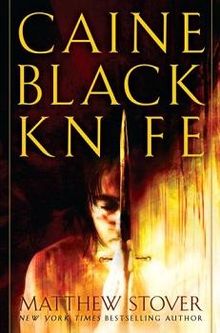Caine’s Law by Matthew Stover
The Acts of Caine series seems to follow a cycle of something contained and disciplined followed by something more grand and ambitious. The first cycle of this technique, Heroes Die followed by Blade of Tyshalle, didn’t really work for me. This second cycle, with the focused Caine Black Knife followed by the unhinged and bizarre Caine’s Law, works much better. The sense of having bit off a bit more than he can chew persists from Blade of Tyshalle, but by keeping the focus firmly on the titular protagonist it avoids its worst missteps. Caine’s Law is ambitious, dazzling and genuinely unique and a memorable ending to one of the strangest fantasy series around.
Caine Black Knife ended on a series of cliffhangers; Orbek’s upcoming trial-by-combat with Angvasse Khaylock, the nature of the Smoke Hunt and, most significantly, Caine’s final arrest and removal, crippled once again, to Earth. To give any significant plot summary for this book without spoiling it feels like an impossible challenge. Caine’s Law takes place in a variety of times and places, some before the events of Heroes Die, as well as between Blade of Tyshalle and Caine Black Knife. The core theme of the novel is deity and religion; considering that at least three figures throughout the series can be said to have ascended to becoming demi-Gods, it’s a theme worth exploring and closes out the series in suitably epic fashion.
Whilst I appreciate the ambition, as with Blade of Tyshalle things fall apart a bit in the execution. I really love what Stover is going for here, but it’s a bit too opaque, a bit too dense. It’s well aware of its own confusing nature, but being aware of your own flaws don’t necessarily stop them from being flaws. The book feels like a dense weave of subplots, rather than having a core strong plot in itself. Some of these subplots work better than others, with a little bit of overindulgence in some areas. A very interesting new character known as the Horse-Witch plays a vital role, but I think perhaps a bit too much time is spent with this storyline, as well as a lot of mediation about horses in general. Still, I ultimately had a better time with Caine’s Law than Blade of Tyshalle because it continues the wise trend from Caine Black Knife in focusing entirely on its titular protagonist.
There have been a lot of unstoppable, ridiculous fantasy badasses, but Caine may be the best I’ve ever seen. More than anything else, this book breaks down exactly who, and what, Caine is, to the very core. Supposedly Stover is writing another book in the setting focusing on Raithe, and despite what I’ve said earlier, I think keeping Caine out of future books, or as a supporting character, is for the best. We know him now, intimately, inside and out. A lot of the time badass characters achieve that through mystery, but we now know pretty much all we could ever want to know about this character, which makes his unique perspective and strength somehow even more compelling. Caine is to fantasy what Batman is to comics, or John Wick to cinema.
Caine’s Law is an ambitious and bizarre way to end the series. Stover doesn’t quite stick the landing, but there’s a lot to be said for shooting for the stars, even if you ever so slightly miss. I look forward to delving into some of his other works, although I think I might skip the novelisation of Star Wars: Revenge of the Sith.



